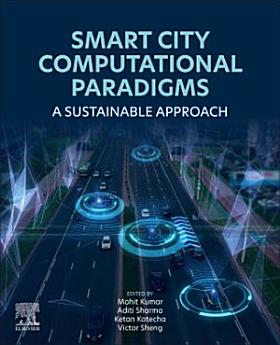Smart City Computational Paradigms: A Sustainable Approach
About this ebook
About the author
Mohit Kumar, Ph.D is working as an Assistant Professor in the Department of Information Technology at Dr. B R Ambedkar National Institute of Technology, Jalandhar, India. He received his Ph.D. degree from Indian Institute of Technology Roorkee in the field of Cloud Computing, 2018, and M.Tech degree in Computer Science and Engineering from ABV- Indian Institute of Information Technology Gwalior, India in 2013. He has received his B. Tech degree in Computer Science and Engineering from MJP Rohilkhand University Bareilly, 2009. His research topics cover the areas of Cloud computing, Fog/Edge Computing, Internet of Things, federated learning, Blockchain, and Artificial Intelligence. He has published more than 70 research articles in reputed journals, IEEE Transactions and international conferences. He is an active reviewer of several reputed journals and international conferences. He has listed in the prestigious Top 2% of Scientists in the world (2023) announced by Elsevier and Stanford University, United States. He is a member of the IEEE.
Aditi Sharma, Ph.D (Senior Member, IEEE) received the B.Tech. degree in Computer Science and engineering from Mody Institute of Technology and Science, Lakshmangarh, India in 2008. She received her Ph.D. degree from MBM Engineering College, JNVU, India in Computer Science and Engineering in 2018. She has worked as Post Doctoral Fellow in School of Engineering and Digital Sciences at Nazarbayev University Kazakhstan in the area of Intelligent Cryptosystems, IoT and cloud in Robotics. She is the visiting faculty at Astana IT University, Kazakhstan and University of Uyo Nigeria. She has published 65 research papers in international journals SCI, ESCI, Scopus and national/international conferences and authored four books. She has published ten patents and also having 19 patents grant in her credit. Her research area includes Cryptography, Block chaining, VLSI, Cellular Automata, Machine Learning, AI chatbots, IOT and artificial intelligence. She is the Life Member of Professional Bodies such as Cryptology Society of India, IEANG and N2women society. She is serving as Conference Chair, General Chair, Technical Programme Committee (TPC) Member and a Reviewer in various Springer, IEEE international conferences. She achieved many awards and scholarships including Nav Shakti Award by North Eastern Council, Ministry of DoNER, Government of India and Best Teacher award.
Ketan Kotecha is currently Director and a Professor with the Symbiosis Centre for Applied Artificial Intelligence, Symbiosis International (Deemed University), Pune, India. His research interests include artificial intelligence, computer algorithms, machine learning, and deep-learning. He has expertise and experience in cutting-edge research and projects in AI and deep learning for the last 25 years. He has published more than 200 papers widely in several excellent peer-reviewed journals on various topics ranging from cutting edge AI, education policies, teaching-learning practices, and AI. He was a recipient of the two SPARC projects worth INR 166 lakhs from MHRD Government of India in AI in collaboration with Arizona State University, USA, and The University of Queensland, Australia. He was also a recipient of numerous prestigious awards, like the Erasmus+ Faculty Mobility Grant to Poland, the DUO-India Professors Fellowship for research in responsible AI in collaboration with Brunel University, U.K., the LEAP Grant at Cambridge University, U.K., the UKIERI Grant with Aston University, U.K., and a Grant from the Royal Academy of Engineering, U.K., under Newton Bhabha Fund. He has published three patents and delivered keynote speeches at various national and international forums, including the Machine Intelligence Laboratory, USA, IIT Bombay, under the World Bank Project, and the International Indian Science Festival organized by the Department of Science and Technology, Government of India. He is an Associate Editor of the IEEE ACCESS. He has listed in the prestigious Top 2% of Scientists in the world (2023) announced by Elsevier and Stanford University, United States.
Victor S. Sheng (Senior Member, IEEE) received the master’s degree in computer science from the University of New Brunswick, Canada, in 2003, and the Ph.D. degree in computer science from Western University, Ontario, Canada, in 2007. He was an Associate Research Scientist and NSERC Post-Doctoral Fellow in information systems with the Stern Business School, New York University, after he obtained the Ph.D. degree. He is currently an Associate Professor of computer science with Texas Tech University and the Founding Director of the Data Analytics Laboratory (DAL). His research interests include data mining, machine learning, and related applications. He is a Lifetime Member of the ACM. He received the Test-of-Time Award for research from KDD 2020, the Best Paper Award Runner-Up from KDD 2008, and the Best Paper Award from ICDM 2011. He is an area chair and a SPC/PC member of a number of international conferences. He is a reviewer of several international journals.







